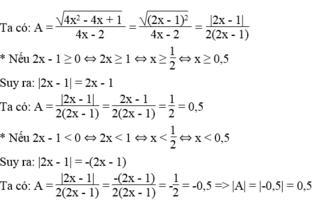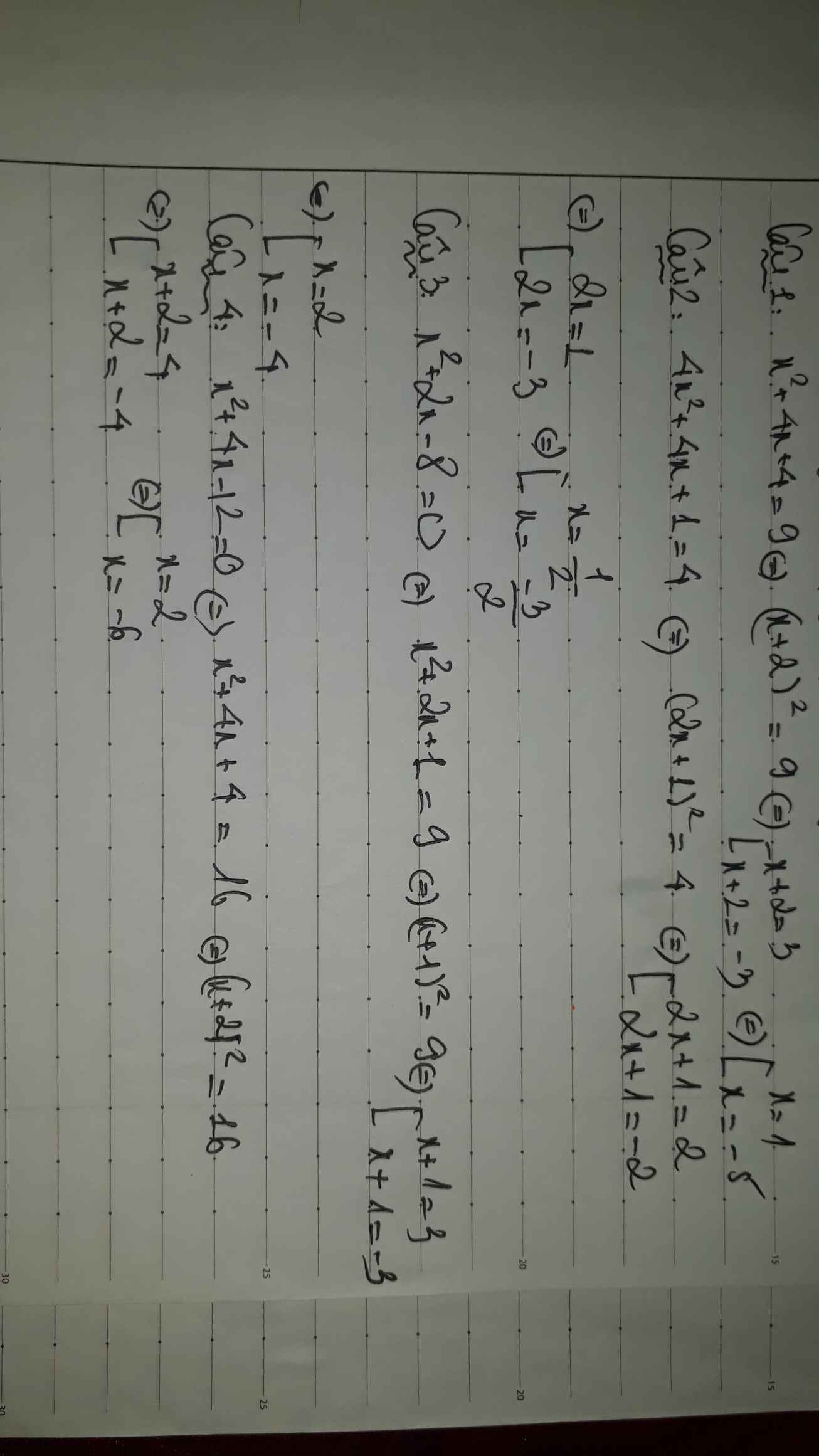-Chứng minh -4x2+4x-12<0 với mọi x.

Những câu hỏi liên quan
Cho A = 4 x 2 - 4 x + 1 4 x - 2 . Chứng minh |A| = 0,5 với x ≠ 0,5.
Chứng minh biểu thức sau xác định với mọi giá trị của x:
A
x
2
−
4
x
2
+
1
x
2
+
4...
Đọc tiếp
Chứng minh biểu thức sau xác định với mọi giá trị của x:
A = x 2 − 4 x 2 + 1 x 2 + 4 x + 5 + 3 2 x .
Bài 3 : Phân tích đa thức sau thành nhân tử
a, x3 + 4x2 + 4x -9y2
b, x3 - 4x2 + 4x - 9y2
Nguyễn Hoàng Minh
1) tìm giá trị nhỏ nhất của
D= 4x-x2+3
E=2x-2x2-5
F=-x2-4x+20
2) chứng minh biểu thức không phụ vào biến
A= (2x+3)(4x2-6x+9)-2(4x3-1)
B=(x+3)3-(x+9)(x2+27)
1. Đề bài sai, các biểu thức này chỉ có giá trị lớn nhất, không có giá trị nhỏ nhất
2.
\(A=\left(2x\right)^3-3^3-\left(8x^3+2\right)\)
\(=8x^3-27-8x^3-2\)
\(=-29\)
\(B=x^3+9x^2+27x+27-\left(x^3+9x^2+27x+243\right)\)
\(=27-243=-216\)
Đúng 2
Bình luận (0)
sửa đề lại thành tìm Max nhé1, vì mấy ý này ko có min
\(1,=>D=-\left(x^2-4x-3\right)=-\left(x^2-2.2x+4-7\right)\)
\(=-[\left(x-2\right)^2-7]=-\left(x-2\right)^2+7\le7\)
dấu"=" xảy ra<=>x=2
2, \(E=-2\left(x^2-x+\dfrac{5}{2}\right)=-2[x^2-2.\dfrac{1}{2}x+\dfrac{1}{4}+\dfrac{9}{4}]\)
\(=-2[\left(x-\dfrac{1}{2}\right)^2+\dfrac{9}{4}]\le-\dfrac{9}{2}\) dấu"=" xảy ra<=>x=1/2
3, \(F=-\left(x^2+4x-20\right)=-\left(x^2+2.2x+4-24\right)\)
\(=-[\left(x+2\right)^2-24]\le24\) dấu"=" xảy ra<=>x=-2
Đúng 2
Bình luận (0)
Bài 1:
a) Ta có: \(D=-x^2+4x+3\)
\(=-\left(x^2-4x-3\right)\)
\(=-\left(x^2-4x+4-7\right)\)
\(=-\left(x-2\right)^2+7\le7\forall x\)
Dấu '=' xảy ra khi x=2
c) Ta có: \(F=-x^2-4x+20\)
\(=-\left(x^2+4x-20\right)\)
\(=-\left(x^2+4x+4-24\right)\)
\(=-\left(x+2\right)^2+24\le24\forall x\)
Dấu '=' xảy ra khi x=-2
Đúng 0
Bình luận (0)
Xem thêm câu trả lời
phân tích đa thức thành nguyên tử:
a, 4x2 +4x-3
b, x2 -x-12
c, x2 +4x+3
a) = (2x+1)^2 - 2^2
= (2x+3)(2x-1)
b) = (x-4)(x+3)
c) = (x+1)(x+3)
Đúng 0
Bình luận (1)
C=4x2+y^2+y^2-4x+8y+12 tìm gtnn
\(C=4x^2+y^2-4x+8y+12\)
\(C=4x^2-4x+1+y^2+8y+16-5\)
\(C=\left(4x^2-4x+1\right)+\left(y^2+8y+16\right)-5\)
\(C=\left(2x-1\right)^2+\left(y+4\right)^2-5\)
Mà: \(\left\{{}\begin{matrix}\left(2x-1\right)^2\ge0\forall x\\\left(y+4\right)^2\ge0\forall x\end{matrix}\right.\)
Nên: \(C=\left(2x-1\right)^2+\left(y+4\right)^2-5\ge-5\)
Dấu "=" xảy ra khi:
\(\left\{{}\begin{matrix}2x-1=0\\y+4=0\end{matrix}\right.\) \(\Leftrightarrow\left\{{}\begin{matrix}x=\dfrac{1}{2}\\y=-4\end{matrix}\right.\)
Vậy: \(C_{min}=-5\) khi \(\left\{{}\begin{matrix}x=\dfrac{1}{2}\\y=-4\end{matrix}\right.\)
Đúng 1
Bình luận (0)
Tim x, biết:
Câu 1. x2 + 4x + 4 = 9
Câu 2. 4x2 + 4x + 1 = 4
Câu 3. x2 + 2x - 8 =0
Câu 4. x2 + 4x - 12 = 0
Tìm X:
a) 16x2-24x+9=25
b) x2+10x+9=0
c) x2-4x-12=0
d) x2-5x-6=0
e) 4x2-3x-1=0
f) x4+4x2-5=0
`a)16x^2-24x+9=25`
`<=>(4x-3)^2=25`
`+)4x-3=5`
`<=>4x=8<=>x=2`
`+)4x-3=-5`
`<=>4x=-2`
`<=>x=-1/2`
`b)x^2+10x+9=0`
`<=>x^2+x+9x+9=0`
`<=>x(x+1)+9(x+1)=0`
`<=>(x+1)(x+9)=0`
`<=>` \(\left[ \begin{array}{l}x=-9\\x=-1\end{array} \right.\)
`c)x^2-4x-12=0`
`<=>x^2+2x-6x-12=0`
`<=>x(x+2)-6(x+2)=0`
`<=>(x+2)(x-6)=0`
`<=>` \(\left[ \begin{array}{l}x=-2\\x=6\end{array} \right.\)
Đúng 2
Bình luận (0)
`d)x^2-5x-6=0`
`<=>x^2+x-6x-6=0`
`<=>x(x+1)-6(x+1)=0`
`<=>(x+1)(x-6)=0`
`<=>` \(\left[ \begin{array}{l}x=6\\x=-1\end{array} \right.\)
`e)4x^2-3x-1=0`
`<=>4x^2-4x+x-1=0`
`<=>4x(x-1)+(x-1)=0`
`<=>` \(\left[ \begin{array}{l}x=1\\x=-\dfrac14\end{array} \right.\)
`f)x^4+4x^2-5=0`
`<=>x^4-x^2+5x^2-5=0`
`<=>x^2(x^2-1)+5(x^2-1)=0`
`<=>(x^2-1)(x^2+5)=0`
Vì `x^2+5>=5>0`
`=>x^2-1=0<=>x^2=1`
`<=>` \(\left[ \begin{array}{l}x=1\\x=-1\end{array} \right.\)
Đúng 2
Bình luận (0)
chứng minh các biểu thức sau ko phụ thuộc vào x
A, (2x+3)(4x2-6x+9)-2(4x3-1)
b, (4x3-1)-(4x-3)(16x2+3)
c, 2(x3y3)-3(x2y2)vs x+y=1
Phân tích đa thức thành nhân tử : (x2 + x)2 + 4x2 + 4x – 12
\(\left(x^2+x\right)^2+4x^2+4x-12=\left[\left(x^2+x\right)^2+4\left(x^2+x\right)+4\right]-16=\left(x^2+x+2\right)-4^2=\left(x^2+x+2-4\right)\left(x^2+x+2+4\right)=\left(x^2+x-2\right)\left(x^2+x+6\right)=\left(x-1\right)\left(x+2\right)\left(x^2+x+6\right)\)
Đúng 2
Bình luận (0)
\(\left(x^2+x\right)^2+4x^2+4x-12\\ =\left(x^2+x+2\right)-4\\ =\left(x^2+x-2\right)\left(x^2+x+6\right)\)
Đúng 0
Bình luận (0)
\(\left(x^2+x\right)^2+4x^2+4x-12\)
\(=\left(x^2+x+6\right)\left(x^2+x-2\right)\)
\(=\left(x^2+x+6\right)\left(x+2\right)\left(x-1\right)\)
Đúng 0
Bình luận (0)




























